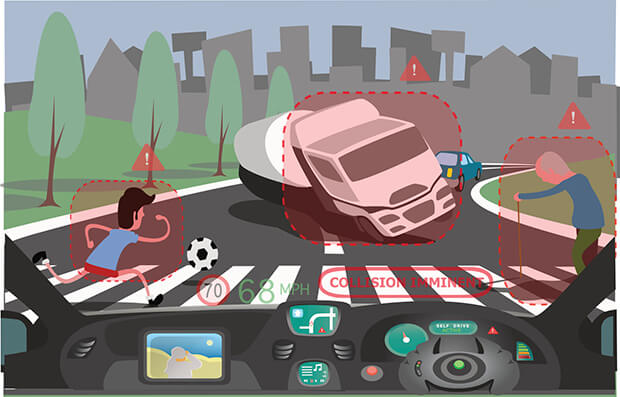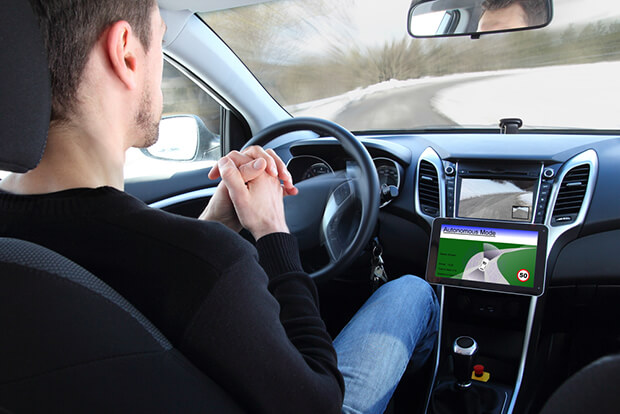Driverless cars will soon make 'life or death' judgements

Driverless cars will soon make 'life or death' judgements
Manufacturers and regulators as well as the general public are asking whether self-driving cars will be capable of ethical decisions, just like humans.
In the very near future, Self-driving cars will be capable of making ‘life or death’ judgements like human drivers could if they are faced with a dangerous situation, such as whether to hit an animal rather than a pedestrian.
A recent study has shown for the first time that human morality can be modelled on a computer.
The determination system would use a simple formula that placed a variety of living things and objects in order, based on their ‘value of life’, or survival.
The controversial technology will make determination on the safety of the driver and pedestrians, especially children, above animals or inanimate objects, for instance, in the event of an unavoidable crash.
With driverless cars expected to be mainstream on European roads by 2025, it is very important that no stone is left unturned when it comes to human safety.
In the future, autonomous vehicles will be able to negotiate traffic lights, junctions and roundabouts and drivers will not need to touch any controls for the entire journey.
The latest findings published in Frontiers in Behavioural Neuroscience say a self-driving vehicle can be moral, acting like humans do or as they are expected to do, contrary to previous thinking.
The creators of the new technology use a technique called ‘immersive virtual reality’. In the development, volunteer drivers are surrounded in artificial images and sounds to provide simulated road traffic scenarios so convincing they were fully engrossed.
The participants in the study were asked to drive a car in a suburban neighbourhood on a foggy day when they experienced unexpected dilemmas with different objects, as well as animals and humans. While encountering these obstacle, they had to decide which was to be spared.

The research showed moral decisions in unavoidable traffic crashes can be well described, and modelled, by a single ‘value of life’ for every human, animal or inanimate object.
Neuroscientist Leon Sutfeld, at the University of Osnabruck, Germany, said until now it has been assumed moral decisions are strongly context dependent, so cannot be modelled or described in a computer formula. He said:
“But we found quite the opposite. Human behaviour in dilemma situations can be modelled by a rather simple value of life-based model that is attributed by the participant to every human, animal or inanimate object.”
The results of the study implies that human moral behaviour can be well described by algorithms that could be used by machines as well.
What this shows is that it is very possible for machines to be programmed in order to make human-like moral decisions it is crucial that society engages in an urgent and serious debate.
Professor Gordon Pipa, a senior author of the study: “We need to ask whether autonomous systems should adopt moral judgement.
“If yes, should they imitate moral behaviour by imitating human decisions, should they behave along ethical theories and if so, which one?. And critically, if things go wrong who or what is at fault?”
The Germans have come up with a set of their own ethical principles. For example, a child running onto the road under their system would be classified as significantly involved in creating the risk, thus less qualified to be saved in comparison to an adult standing on the footpath as a non-involved party.
The researchers say autonomous cars are just the beginning as robots will be utilised in hospitals and other artificial intelligence systems becoming more commonplace. They warn, we are now at the beginning of a new age with the need for clear rules, otherwise machines will start making decisions without us.

(As always, if you or a family member are considering buying a used car, don’t buy until you run a car check report with MyVehicle.ie where you will find out the true history of the vehicle.)

Author

Justin Kavanagh
Justin Kavanagh is a recognised leader
in automotive intelligence and vehicle
data supply to the entire motor industry.
He has almost 20 years experience in
building systems from the ground up.
As the Managing Director of Vehicle
Management System, he understands the
need and importance of trustworthy and
reliable vehicle history and advice to
both the trade and the public.
Follow me on LinkedIn